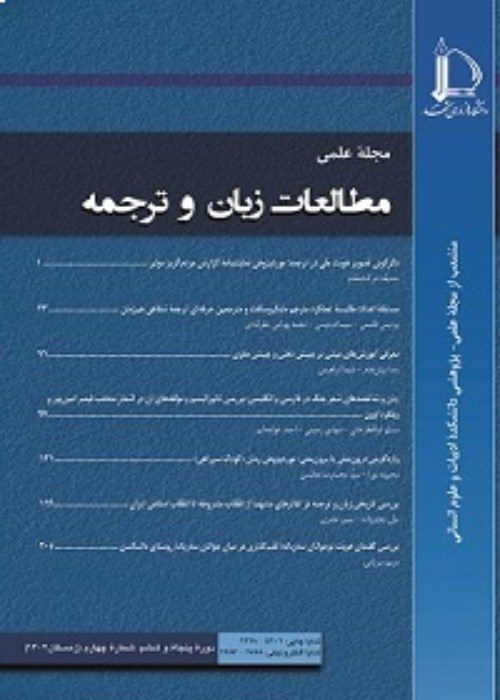Gustave Flaubert in Iran
Author(s):
Abstract:
Introduction
Gustave Flaubert, the leader of realism and the modern novel, is an influential French novelist. It should be noted that the careful attention in choosing the words distinguishes his style from other writers. His biggest concern in life is social problems. His masterpiece Madame Bovary is a novel which influences many famous romans. Although some of his works have been translated into Persian, these works have been translated again and again which means his works have the important place in Persian literature. This article will attempt to examine the position of the author, his work, and his influence on Persian writers and their styles.Theoretical Framework: Gustave Flaubert is are a list, social and political writer. Flaubert loved literature when he was a young boy. He started writing and created some books that became masterpieces. These were often fanciful stories with the theme of autobiography (autobiography) (i.e. Asmar[Smarh]). His interest in writing history was influenced by his teacher in high school. He went to Paris to study legal rights after completing high school at the age of 18. Death of his father, sister, and his passionate love of Mrs. Eliza Schlesinger (Elisa Schlésinger) influenced his esprit because he did not forget it. That is why his novels are the mirror of his life. Elisa Schlesinger inspired works such as Diary of a madman (Mémoires dun Fou) (which depicts mystical love), November (Novembre) (which tells the love of land and physical love), and Sentimental Education (L'Éducation sentimentale). He always detested the bourgeois class. He attacked bourgeois type with the character of Homais (Homais) in Madame Bovary (Madame Bovary).The collection of his works can be divided into three categories: the first category is anti quityi son which Salammbô (Salammbô) and Hrvdya (Hérodias) reflect. The second category of works of art such as the legend of St. Julian (La légende de Saint Julienl' Hospitalier) and third category is fictional works such as the Temptation of Saint Antoine (La Tentation de Saint Antoine). At first glance, a kind of contradiction is evident in Flauberts work; however ,there is one thing in common behind these different works, and that is the beauty of art.
Realistic styles, literary arrays, the structure of rich sentences and deep psychological analyzes illustrate the features of his writing. Deep Flauberts thoughts influenced the worldview of the other great writers and writing styles .In writing Madame Bovary, Flaubert opens new windows to realism. Throughout this book, Madame Bovary, the blame against romanticism is evident. Despite the fact that Flaubert inherited his writing style, words, and songs from Romantics, finally he concluded that he should harness the power of his imagination. This article describes the researches on translations of his works too.
Methodology
In this article ,first we intend to introduce Flaubert and realism school and we consider their impact on Persian literature. In doing so, the East impact on Flaubert and his writing techniques are examined. Then, the history of translation, its evolution, and the factors involved in translations are exhibited. This article attempts to survey all of the Flauberts translations as far as possible.Results and Discussion
There is no doubt that a lot of research on Gustave Flaubert and his work has be end one. We sometimes encounter more than 10 different translations of his novels. Despite the fact that Flaubert is one of the world's great authors, his books were translated into Farsi very late; however, this issue can also be very beneficial. It is important that the translators have their own styles.Conclusions& Suggestions: Gustave Flaubert is one of the greatest novelists. Flaubert's careful choice of words and figure of speech is unique and clearly shows the excessive obsession of Flaubert in the creation of a literary work. Translations of western writers altered the writing style and fiction in Iran so that the role of other writers out shines that of Flaubert. However, Flauberts work could not be successful (in Iran). Like Balzac the folk did not pay attention to his masterpieces; however, Madame Bovary gained big success among Iranians, and his books were translated into Farsi one after another.
Keywords:
Language:
Persian
Published:
Language and Translation Studies, Volume:48 Issue: 3, 2015
Page:
29
magiran.com/p1570692
دانلود و مطالعه متن این مقاله با یکی از روشهای زیر امکان پذیر است:
اشتراک شخصی
با عضویت و پرداخت آنلاین حق اشتراک یکساله به مبلغ 1,390,000ريال میتوانید 70 عنوان مطلب دانلود کنید!
اشتراک سازمانی
به کتابخانه دانشگاه یا محل کار خود پیشنهاد کنید تا اشتراک سازمانی این پایگاه را برای دسترسی نامحدود همه کاربران به متن مطالب تهیه نمایند!
توجه!
- حق عضویت دریافتی صرف حمایت از نشریات عضو و نگهداری، تکمیل و توسعه مگیران میشود.
- پرداخت حق اشتراک و دانلود مقالات اجازه بازنشر آن در سایر رسانههای چاپی و دیجیتال را به کاربر نمیدهد.
In order to view content subscription is required
Personal subscription
Subscribe magiran.com for 70 € euros via PayPal and download 70 articles during a year.
Organization subscription
Please contact us to subscribe your university or library for unlimited access!


